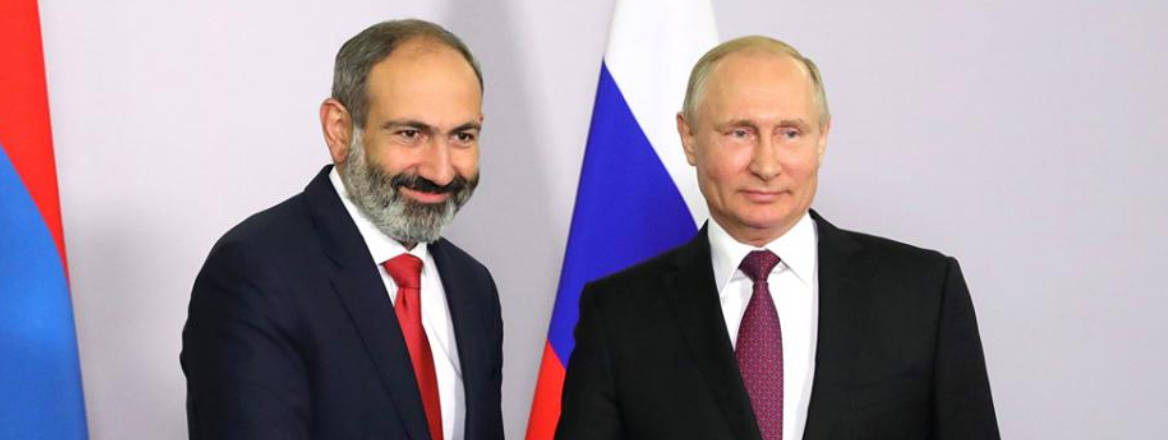When the Chips Are Down: Russia’s Stance in the Current Azeri–Armenian Confrontation
As fighting over Nagorno-Karabakh continues into its second week, Russia faces a dilemma about how to respond to the crisis. And Turkey’s newly assertive approach is challenging Russia’s established position of regional dominance.
For nearly 30 years, Russia has portrayed itself as the leading player in the South Caucasus. Shaping the regional ‘rules of the game’ over the Nagorno-Karabakh conflict through the role of mediator has been critical to this claim and has provided Russia with significant leverage. As violence has erupted over the disputed region, officially part of Azerbaijan but de facto controlled by separatist ethnic Armenians backed by the Armenian government, Moscow has once again sought to position itself as the key mediator in the conflict.
The Regional Balancer?
On 28 September, Kremlin spokesman Dmitry Peskov asserted that ‘Russia has always maintained a balanced position’. On 1 October, a joint statement was issued by Russian President Vladimir Putin together with the presidents of France and the US, which called for ‘an immediate cessation of hostilities between the relevant military forces’. This was followed on 4 October by a call from Russian Foreign Minister Sergey Lavrov for an immediate ceasefire, accompanied by an offer for Russia to broker one.
In setting out its position as the lead mediator, Russia has sought to rely on its established twin-track diplomatic approach to the conflict. In the first track, Russia, together with the US and France, serves as a co-chair of the Organization for Security and Co-Operation in Europe (OSCE) Minsk Group, a body set up in 1994 to mediate in the Nagorno-Karabakh conflict. With Russia granted equal status alongside the US and France, Moscow has enjoyed international blessing for its efforts to damp down tensions as they have arisen.
While participation in the OSCE process has provided legitimacy to Russia’s special role, Moscow has also pursued its own diplomatic track towards the conflict. In the past, Russia has led on substantial efforts to end the conflict, notably in 2011 under President Dmitry Medvedev. At the same time, while Moscow is considered the most significant outside mediator in the Karabakh conflict, in reality Russia has its own key interests linked to the region and has pursued them in a semi-detached relationship with the OSCE Minsk Group and through parallel bilateral policies towards Armenia and Azerbaijan. Russia’s mediation efforts should thus be seen as part of a wider strategy to shape a balance of power in Moscow’s favour around the conflict.
Russia has traditionally looked on the South Caucasus region as a buffer to Middle East instability and against a larger Turkish regional role. For this reason, throughout the post-Soviet period, Russia has maintained a close relationship with Armenia, its key regional ally. Armenia hosts a Russian army base (Gyumri) and an airbase (Erebuni). In 2010, Armenia and Russia agreed to extend the Russian presence until 2044 in exchange for security guarantees, including providing discounted modern weaponry to Armenia’s armed forces. Armenia is also a member of the Russian-led Collective Security Treaty Organization.
Moscow’s security relationship with Yerevan has been critical to Russia’s wider regional position, particular after relations with Tbilisi collapsed following the 2008 Russia–Georgia war. As Russia’s Black Sea influence has expanded, especially following the annexation of Crimea in 2014, and in the Middle East with the military intervention in Syria from 2015, the strategic significance of the security relationship with Armenia has grown for Moscow.
While Russia has taken the lead on regional diplomacy over the Karabakh conflict and developed its security relationship with Armenia, the strength of its regional position has rested on its ability to position itself as a pivotal power that balances between the various sides. Central to this position has been Moscow’s ability to enjoy positive relations with Azerbaijan at the same time as maintaining its key ties to Armenia. This balance has been achieved over the past decade with Russia undertaking large-scale arms sales to Azerbaijan, while also building close ties to the Azeri elite.
Alongside its approach to Armenia and Azerbaijan, Russia has sought to keep Turkey at a distance from regional affairs. Russia has looked to promote a set of mutual interests, notably energy relations, between Moscow and Ankara that would preclude Turkey from taking a stronger role in the South Caucasus.
Turkey and the Shifting Ground
Moscow’s Karabakh policy has worked well for almost three decades. However, the geopolitics of the Caucasus have begun to shift. In recent years, Turkey has taken a stronger independent regional role, notably in regard to the conflicts in Syria and Libya, and in the eastern Mediterranean. This has brought Ankara into direct competition with Moscow. As part of this shift, Turkey has sought to assert a firmer role in respect to the Karabakh conflict. The new strong line in support of Azerbaijan from Ankara was already evident in July 2020, when fighting erupted for five days along the Armenia–Azerbaijan border.
During the current round of fighting, Turkey has been strident in its support for Azerbaijan and its territorial claims. Significantly, not only has Turkey noticeably strengthened its political and diplomatic support to Azerbaijan, but also its technical cooperation through the sale of drones, military exercises and its reported role in deploying Syrian fighters to the conflict.
President Recep Tayyip Erdoğan’s goal with the new Karabakh policy is to marginalise the Minsk Group and force his way to a place at a new negotiating table where an eventual settlement of the Nagorno-Karabakh conflict would be worked out, enabling Turkey to claim a wider regional role. Thus, in response to Russia’s call for a ceasefire, Erdoğan declared that Ankara would continue to provide ‘all types of support’. Indeed, he went further to criticise the OSCE Minsk Group co-chairs for failing to resolve the long-running dispute over Nagorno-Karabakh, and suggested that the current Karabakh conflict was part of a wider crisis that began with the 'occupation' of Crimea.
Russia appears to have been caught unprepared for Turkey’s new assertiveness and is struggling to find a meaningful response. Thus, having initially followed the trusted approach of offering to mediate a ceasefire under the OSCE umbrella, on 1 October Russia indicated that it was ready for ‘close coordination’ with Turkey on a ceasefire and to stabilise the situation, despite the earlier statements of Erdoğan demanding a full withdrawal of Armenia from the area. Subsequently, however, Russia has reverted to asserting its balanced approach and the centrality of the OSCE for resolving the conflict.
The shifting regional security dynamics around the Karabakh conflict now pose a direct challenge to Russia’s regional position. Turkey’s new attitude has unsettled Russia’s balancing approach by giving Azerbaijan an alternative to Moscow. President Ilham Aliyev has thus been emboldened to pursue and sustain a military course, and to resist Russia’s calls for a ceasefire.
Russia is now confronted with an unpalatable choice. Moscow could accept Turkey as an equal partner in a new regional settlement, which would mean that the South Caucasus will likely become another zone for Turkey–Russia proxy competition (alongside Libya and Syria), which could destabilise the South Caucasus further.
Given that a central pillar of Putin’s rule has been the assertion that no power other than Russia should be able to interfere in the security politics of the former Soviet territories, at present Moscow is clinging to the trusted approach of presenting itself as a mediator that enjoys good relations with both sides and waiting for the current round of fighting to subside so that it can play its traditional role.
However, with Russia’s leverage weakened on Azerbaijan as a result of Turkey’s support, the conflict risks escalating to a full-out regional war that could ultimately raise the question of the extent to which Russia is willing to honour its security commitment to Armenia and abandon its stated position of balance, or risk losing credibility as a security actor. Meanwhile, Turkey is continuing to set the diplomatic agenda with the visit of its foreign minister to Azerbaijan today. Increasingly, Moscow’s traditional play is no longer capable of ensuring its leading regional role and the Kremlin faces a strategic juncture in its post-Soviet policy for the South Caucasus.
The views expressed in this Commentary are the author's, and do not represent those of RUSI or any other institution.
WRITTEN BY
Dr Neil Melvin
Director, International Security
International Security


